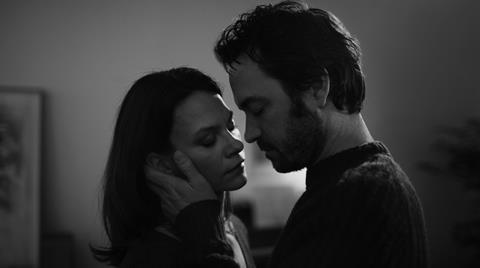Dir/scr: Francois Delisle. Canada. 2015. 97mins

A somber sketch of a couple crushed by the grief of losing a child, Francois Delisle’s new feature film, shot entirely in black-and-white, which renders it all the more tragic, will no doubt appeal to sensitive, compassionate audiences, even if most of the elements it features will be familiar from countless previous attempts to deal with the same theme, both in cinema and television.
The film’s characters behaviour and their reactions are not really surprising, though they are fully committed to them, but Delisle pushes both Ricard and Malette to the verge of over-acting by not trusting the images to convey the full extent of their misery.
The marriage of Christophe (Sebastien Ricard) and Irene (Fanny Malette) fell apart when their eight year-old son, Hugo, disappeared without leaving a trace. Christophe runs away to Mexico, lives on the beach, takes on all sorts of odd jobs to survive but spends most of his time wallowing in his own sorrow. A sequence showing ocean waves rolling his inert naked body up and down the beach gives a pretty accurate idea of his state of mind, also visually recalls the opening sequence of Kiarostami’s Five which was meant to generate similar emotions.
Irene remains in Montreal, bottles down her pain the best she can but can’t help occasional outbursts to take over once in a while. Back with a vocal octet specialising in pre-classical music, she shuts herself off the rest of the world, with the exception of the uneasy relationship she entertains with her widowed mother (Genevieve Bujold).
Ten years later, a pedophile prison inmate claims responsibility for Hugo’s death and the parents are called in to fulfill the formalities and take charge of the funeral. Christophe flies in and moves in for a week with his father (Pierre Curzi), to face, together with Irene, a series of painful procedures, inevitable in such cases, from the heart-wrenching moment when they face the remains of the child’s skeleton, all the way to the borders of morbidity, when they listen to the confession of the murderer describing in detail everything he did to the boy.
But once the conclusive proof that Hugo is no more has been produced, they both feel the pressure of uncertainty and doubt being lifted from their shoulders, and for the first time in a long while they actually dare contemplate the option of a future, with the ending promising them a kind of deliverance, if not total and immediate, at least a glimpse of the light at the end of the tunnel.
Delisle, the author of the film in every sense of the word (he wrote the script, produced the picture, directed it and was the cinematographer as well as the editor), offers here an entirely fictional, intellectualised version of people dealing with personal loss, guided by his personal assumptions and impulses, using a slow ceremonial pace, painstakingly framed images with a predilection for close-ups and underlining it all with extensive, highly emotional voiceover texts.
The film’s characters behaviour and their reactions are not really surprising, though they are fully committed to them, but Delisle pushes both Ricard and Malette to the verge of over-acting by not trusting the images to convey the full extent of their misery. No wonder that under the circumstances, the restrained, touching performances of such experienced veterans as Bujold and Curzi in supporting parts make far more sense.
Production company: Films 53/12
International sales: Doc & Film Internationalwww.docandfilm.com
Producers: Francois Delisle, Maxime Bernard
Cinematography, Editing: Francois Delisle
Production designer: Genevieve Lizotte
Music: Robert Marcel Lepage
Main cast: Sebastien Ricard, Fanny Malette, Genevieve Bujold, Pierre Curzi, Antoine L’Ecuyer, Luc Senay, Didier Lucien, Suuns Rock Band





















